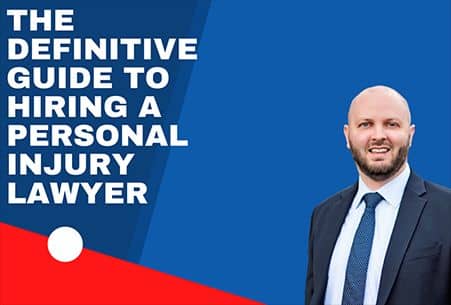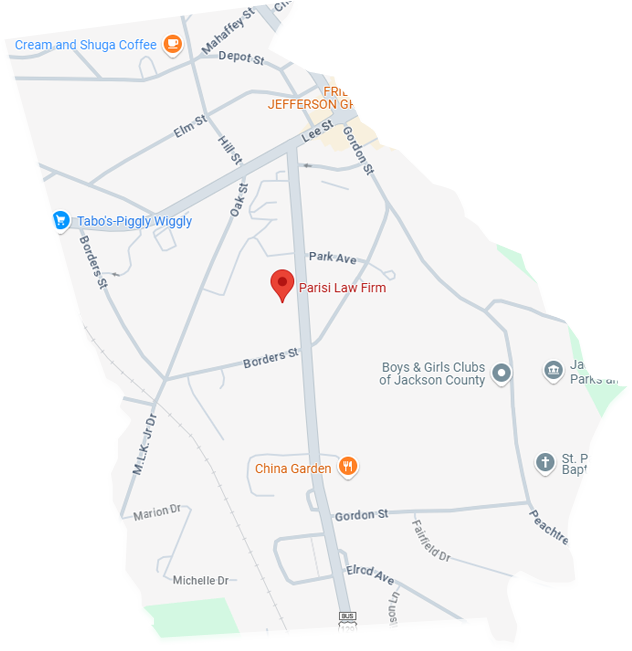How to choose the best personal injury attorney for you without making a mistake that will cost you money or cause a headache.
By Jerry Parisi
If you have been injured in an accident, you are probably considering hiring a lawyer to represent you. Unfortunately, finding the right attorney is not an easy process. This article will help you navigate the process, think about what’s important, and hopefully give you an idea of how to choose the right personal injury attorney for your situation.
There is no shortage of personal injury attorneys. The honest reason for this is because personal injury attorneys can make a lot of money, in addition to being able to make a major difference in people’s lives. In fact, personal injury is one of the more lucrative practice areas for attorneys. This unfortunately attracts a lot of lawyers to the industry, and not all lawyers are created equal. And not all lawyers are ethical, competent, and hard-working.
The different types of personal injury law firms:
The High-Volume “Mill”
These are the firms you are probably most familiar with. They advertise everywhere: billboards, radio, TV, park benches, on the sides of buses, etc. There’s no escaping them. They have catchy phrases, jingles on the radio, and big smiles that beam down on you from the side of the highway. They spend a ton of money to get a ton of cases, and they have hundreds (if not thousands) of clients at the same time. That means, as a client, you are likely just a number to them. The named partner with the good hair and the big smile probably doesn’t know your name or what your case is all about. They may not know what your injuries are or how they’ve affected your life. They usually have younger associate attorneys, paralegals, and legal assistants working on your case. And turnover can be high.
To be clear, there is nothing inherently wrong with this type of firm. They have a business model that works. Think of them as the McDonald’s of law firms. They are designed to get you a quick settlement, without any personalized service. Just don’t be surprised if your order gets messed up.
The Expert
There are attorneys who have worked for years, decades even, perfecting their craft. They’re experienced and they usually specialize in a particular “niche” area of the law. For instance, instead of taking any type of personal injury case, they only take car accidents caused by large commercial tractor trailers, or wrongful death birth injury cases. Some may take a variety of different types of injury cases, but only the ones where the clients suffered very significant catastrophic injuries.
These firms are almost always very good at what they do. All the other lawyers in town know them and send them the big important cases, and as a result, these firms get to pick and choose the best cases. This means they turn down a large number of cases because they don’t need the work. Think of these firms as the fancy restaurants downtown that require reservations to get in. If you can get in, by all means, you may want to consider hiring one of these firms.
How do you get in? As mentioned above, most lawyers in town know which firm is the right fit for that big case, whereas most non-attorney individuals have never heard of these firms. So if you can find a local attorney that you trust, that attorney can be your best advocate. Instead of taking on a huge case, the smart local attorney will seek out the best firm to “co-counsel” with. The client then gets the benefit of having two law firms representing him or her. The best part is that it doesn’t cost the client any extra money at all. Attorneys that “co-counsel” this way split the fee (and the work) between themselves and the percentage that the client pays doesn’t increase. This type of arrangement is usually a “win-win-win” for all involved. Except the insurance companies that is.
The Jack of All Trades
Some attorneys will take any case that walks through their door. From criminal cases, to writing wills, to divorce. They never learned to specialize in a particular area of law, or perhaps they just enjoy working on a variety of cases. Lawyers who are located in a small town or rural area often have to do this to keep the doors open because there are just not as many potential clients to focus on one area of the law. And you may want to work with someone local, even though you can usually hire any attorney who is licensed in your state. That’s understandable. Sometimes though, these attorneys have never worked on a case like yours, of if they did, it may have been years ago. Insurance companies know this. They have databases with every lawyer in them, and they know how many personal injury cases they work, and what their results are.
The Solo Personal Injury Lawyer
These attorneys are often called “solo” attorneys if they don’t have a partner or any associate attorneys. They could also just be a small boutique firm with only a couple lawyers. These firms take a limited number of cases because they cannot handle high volumes. They often are selective in the types of cases they take because they don’t have the machine set up to crank out a bunch of small dollar cases. On the other hand, if they get a huge case in, they will often team up with a firm in the “Expert” category, because those firms have the resources to invest in a larger case (which often require several expert witnesses, depositions, etc.).
The Solo Personal Injury Lawyer will often give great service because they know every single one of their clients. The solo attorney usually “does it all” as far as marketing, sales, networking, legal work, etc. They are intimately involved in every step of your case. They cannot compete with the advertising budgets of the big firms, so they rely on their former clients to refer them business. Therefore, they strive to take care of their clients and get them the best results with the best service. The future of their business depends on it.
What to look for in an accident and injury lawyer:
When searching for an attorney (any type of attorney), you should try to find one that has the following traits. Although that is easier said than done, you can evaluate attorneys based on their reputation, online reviews, and what they say during any consultations you may have with them.
1. Trust.
You should be able to trust your attorney from day one. If you don’t believe what they say, how can you believe them to give you the right advice when you have a settlement offer on the table?
2. Honesty.
Are there any honest attorneys out there? There are more than you may think. The few that are not honest make the news and you hear about them all the time. You’ve probably heard the lawyer jokes and stories about scam artists. Some lawyers, however, are good people who are just trying to make an honest living doing something they love. And then there are number of lawyers who live in the gray area in between honesty and dishonesty. You can often tell who they are by listening to the answers they give to your questions. Do they answer your question directly or do they answer a different question the way politicians do?
3. Competence.
The State Bar of Georgia has a rule that attorneys must provide competent representation to their client. This means that a lawyer shall not handle a matter which the lawyer knows or should know to be beyond the lawyer’s level of competence without associating another lawyer who the original lawyer reasonably believes to be competent to handle the matter in question. Competence is often highly connected to experience, so ask every attorney you meet with to describe their level of experience with cases like yours, whether it be a car accident, dog bite, slip and fall, or other injury case.
4. Relationship.
In addition to the above, it’s usually important that you get along well with your attorney (and his or her staff). Do they make you feel comfortable? Does the attorney speak to you like a normal human being or talk over you the way lawyers tend to do? If you don’t have a good working relationship with your attorney, you may not be happy with the results even if you get a very favorable settlement.
5. Reputation.
A lawyer’s reputation will usually disclose whether they excel in the above-listed areas. Ask around to see if anyone you know has an experience with the lawyer or their firm. Check their online reviews (and read with scrutiny to see if they’re real). It may be concerning if the attorney has little to no online presence in this day and age. Don’t just hire someone who talks a good game. See what others are saying about them as well.
How often will your lawyer communicate with you?
Communication could have gone in the previous category of important traits but it is so important that I think it deserves more attention.
The majority of bar complaints against attorneys are caused by poor (or no) communication. If you can’t get a hold of your lawyer, or if they don’t return your calls, emails, or text messages promptly, then you may feel like you’re not getting the attention you deserve. And that’s a problem. The insurance company is really the opposing party in a personal injury case, and you should expect that type of dismissive behavior from them. Your attorney, however, is supposed to be your number one advocate. They should respond and answer and questions or concerns you have in a timely manner. That’s not to say that your attorney needs to be at your every “beck and call.” Your attorney is not your butler, or even your employee. With that said, he or she is also not above you just because they went to law school and passed the bar.
What you should expect is regular updates on your case, updates whenever something significant happens in your case, and timely responses to your phone calls, email, and text messages. “Timely” depends on the circumstances. If you have a major emergency that effects your case, then you should get a response within one business day. If it’s a normal request for a status update, a response a few days later is probably acceptable (you never know how busy your attorney is – he or she may be in trial for a whole week which needs their full undivided attention).
Communication expectations should be set at the initial meeting. If your attorney is not fulfilling your expectations, let him or her know early so that it does not become a problem. Get to a place where you can both be on the same page and satisfied with the arrangement.
How much does a personal injury attorney charge?
You have probably seen the advertisements that go something like this: “We don’t get pain unless you get paid!” or “No fee unless we win!”
Virtually every personal injury attorney works on what’s called a “contingent fee basis.” This means that the attorney’s fee is contingent upon whether they win or settle your case. You will not be required to pay your attorney for the work done on the case if you lose.
Contingent fees are usually calculated as a percentage of the client’s recovery. The percentage can vary based on the attorney and their level of experience and skill. The most common contingent fee is probably one-third (1/3) of the client’s recovery if the case is settled prior to litigation, and forty percent (40%) if a lawsuit must be filed. However, we’ve heard of attorneys charging as low as twenty-five percent and as high as forty-five or fifty percent. It really all depends on the attorney and the case you have. If you have a case that may be more difficult to prove, the attorney may charge a higher percentage because the risk of losing is higher. It just depends.
There are also costs and expenses that must be considered. During your case, the attorney will generally pay for things out of his own pocket. Things like postage, invoices for medical records, depositions, court costs, expert witnesses, etc. At the end of the case, the attorney will deduct these costs and expenses from the client’s recovery. You want to be sure to ask your attorney how he or she handles costs. You may be required to pay court filing fees, the costs related to deposing witnesses, and similar charges even if you lose your case. Be sure to ask up front.
One thing to consider is that just because an attorney charges a lower fee does not mean that you will end up with more money in your pocket. If the attorney is not as good as other attorneys at obtaining higher settlements or verdicts, then the total recovery will be lower, so the lower contingent fee may not benefit you after all.
A good rule of thumb is that you probably shouldn’t choose a personal injury attorney solely based on the contingent fee percentage that they charge. You may want to weigh other factors more heavily.
Does the attorney make guarantees?
Be very careful if an attorney is willing to guarantee that your case is worth a certain amount (or even within a certain range). No attorney should be able to guarantee you something like this because there are just too many variables at play. If an attorney guarantees their results, either get it in a written binding contract that specifies what happens if they don’t meet those results – or run. I’d choose to run, personally.
What is your personal injury case worth?
Although your lawyer shouldn’t make concrete promises and guarantees about how much your case is worth, they should be experienced enough to know what your case entails. What your case is worth involves many factors, including the extent of your injuries, the anticipated necessary medical treatment, whether the other party may be subject to punitive damages, and all of the other facts and circumstances of your particular case.
Are you stuck with the first attorney you choose?
This is a great question and one that I am often asked. The short answer is that you can almost always fire your attorney whenever you want.
One caveat to be aware of is that the fired attorney may have a lien against your recovery for the work they did on your case prior to termination. Be sure to read the attorney’s engagement agreement before you sign and make sure to get a copy for yourself so you can refer back if you have an issue. The engagement agreement should specify how you can terminate your attorney and what happens if you decide to do so.
If you’re unhappy with your current attorney and you begin reaching out to other attorneys, be sure to let them know that your currently represented. You don’t want to hide the fact that you already have an attorney.
Does location matter?
Not as much as you may think. Odds are that you won’t have to travel to your attorney’s office very often. Usually, clients only come to my office a couple of times. First, for the initial consultation and sign-up, then they usually don’t come in until their settlement check arrives and they come to pick it up. If it becomes necessary to file a lawsuit, however, a couple more trips may be necessary (for a deposition or trial prep perhaps). Hiring a lawyer on the other side of the state may not be the best idea in the world, but if their office is within a reasonable distance then you will probably be fine.
Does the lawyer go to court?
This may seem like a silly question, because you may think “of course all personal injury lawyers go to court.” Not so. In fact, more and more, lawyers are specializing in pre-lawsuit settlement negotiations. These lawyers have realized that the largest return on investment is settling cases without filing a lawsuit. Why? Because going to court is expensive, time consuming, and nerve-wracking. So many lawyers don’t want to do it.
On the other hand, there are many lawyers that love going to court, and will file lawsuits at the drop of a hat because that is what they’re comfortable with. This may not be the best way to maximize your recovery.
What you should try to find is a lawyer who is not afraid to go to court, but for the right reasons. Like when the insurance company won’t make a reasonable settlement offer. Or when you have a large case that can only be maximized by a jury award.
Talk to potential lawyers about their track record in court and find one that you’re comfortable representing you both pre-suit and in front of a jury.
Who will be working on your case?
I touched on this a little bit in the first section on the different types of law firms, but it is a very important point. Oftentimes, the attorney you hire has staff that does most, if not all, of the work. This may not be an issue, but if the lawyer is designating the important legal work to non-attorney staff or brand-new lawyers, then it may be a red flag.
How involved in your case will your attorney be? Will he or she know the status of your case when you call for an update? Or will they have to “look into it and call you back?”
Ask your attorney who does what work in the office and make sure you’re comfortable with the answer. Otherwise, you may end up paying your attorney a third of your recovery just to put their name on some documents that someone else prepared, and some phone calls and settlement negotiations made by a paralegal.
What else should you consider?
Disciplinary record: check with your state’s bar association to see if the attorney has been disciplined in the past and if so, what for? Also, make sure he or she is currently licensed and in good standing with the bar.
Relationships: does your potential attorney have good working relationships with other attorneys in the industry, with medical providers, with judges?
Availability: be sure to meet with the actual attorney before you sign the engagement agreement. Unless he or she is out of town or in trial, the lawyer should make it to the initial client meeting.
Experience: most place experience much higher on the list of things to consider when selecting a lawyer than I do. Perhaps it’s because I’m new to the game. But I’ve won jury trials against attorneys with over 30 years of experience, held my own against partners at big fancy downtown firms, and gone toe to toe with guys with reputations for being sharks – all with nothing but a few years of experience, my laptop, cell phone, and some shared office space. In my book, doing the right thing for your clients and putting in the work beats years of experience all day long.
Conclusion
It’s a daunting task to find the right lawyer for you and odds are there is no “perfect” attorney for you and your situation. At the end of the day, once you find an attorney who meets most of your criteria, you should make sure that you actually like the person. You will probably have to work with him or her for several months, if not several years. Having a good working relationship is important to being satisfied with the ultimate experience.
No matter how experienced a lawyer is, or what type of past results they’ve obtained, it can’t make up for a lack in connection and personality. A personal injury case is exactly what it sound like: personal. You will be sharing intimate details about your life and medical treatment with your attorney throughout your case. Make sure you share these details with someone you trust, respect, and get along with.






